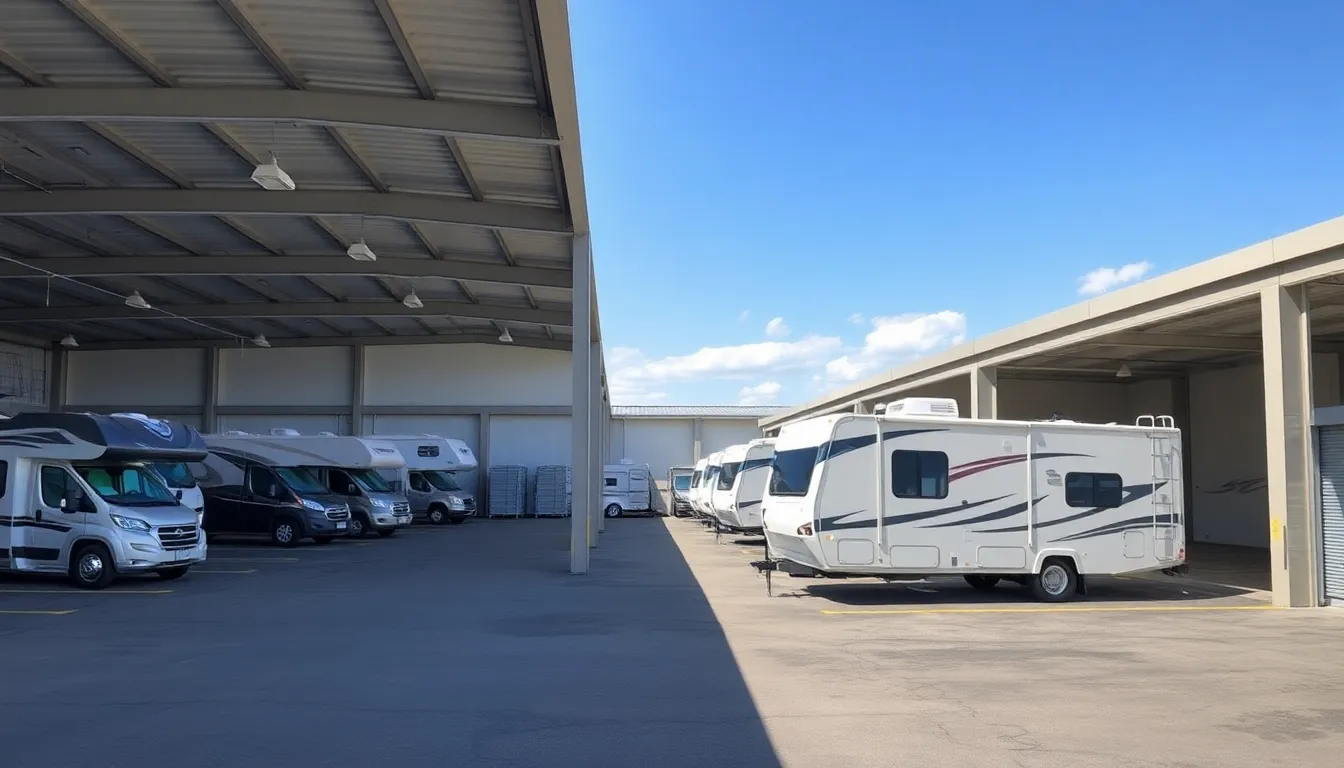Finding the perfect RV storage unit can feel like searching for a needle in a haystack—if that haystack was also on a road trip and had a penchant for adventure. With so many options out there, it’s easy to get overwhelmed. But fear not, because the right storage solution is just around the corner, ready to keep your beloved RV safe and sound while you plan your next escapade.
Table of Contents
ToggleUnderstanding RV Storage Units Near Me
Finding the perfect RV storage unit becomes simpler with some knowledge about what options are available. Understanding the features and benefits of local RV storage units helps ensure the RV is well protected and easy to access.
What Are RV Storage Units?
RV storage units provide designated spaces for parking recreational vehicles. They come in various types, including outdoor parking spaces, covered parking, and fully enclosed units. Outdoor options offer basic protection from the elements, while covered and enclosed units give enhanced security. Many facilities also include amenities such as 24-hour access, video surveillance, and on-site management. People can choose the type of storage unit that best suits their RV size and protection needs.
Benefits of Using RV Storage Units
Using RV storage units offers several advantages. First, secure environments reduce the risk of theft or damage. Regular maintenance becomes easier, as it allows RV owners to keep the vehicle clean and organized. Utilizing storage units saves space at home, freeing up the driveway or yard for everyday vehicles or landscaping. Most facilities provide flexible rental options, accommodating both short and long-term needs. Choosing a nearby storage unit enhances convenience, making it simple to pick up or drop off the RV for weekend getaways or extended trips.
Types of RV Storage Units

Finding the right RV storage unit involves understanding the different options available. Each type offers unique benefits tailored to individual needs.
Indoor vs. Outdoor Storage
Indoor storage provides protection from weather elements, while outdoor storage typically offers more accessible parking. Facilities with indoor units often maintain higher security levels, reducing theft risks. Conversely, outdoor options usually cater to higher volumes, making them cost-effective for larger RVs. Owners can choose based on their RV’s needs and personal preferences. If maximum protection is a priority, selecting indoor storage could be the best choice. Outdoor storage suits those seeking budget-friendly alternatives.
Climate-Controlled Storage Options
Climate-controlled storage units help maintain stable temperatures and humidity levels, protecting RVs from extreme conditions. Such environments prevent damage from mold, mildew, and rust, essential for long-term storage. These units are ideal for high-end RVs or those with sensitive interiors. While often more expensive, the added protection can save on costly repairs. RV owners find peace of mind knowing their vehicles remain in optimal conditions. For those in regions with significant temperature fluctuations, climate-controlled options offer invaluable benefits.
Factors to Consider When Choosing RV Storage
Choosing the right RV storage involves multiple considerations to ensure safety and convenience. Understanding essential factors enhances the decision-making process.
Size and Space Requirements
Determine the dimensions of the RV to select an appropriate storage unit. Available options range from standard parking spaces to larger enclosed units, catering to various sizes and models. Owners should consider additional space for accessories like trailers or towing equipment. Units with sufficient clearance height offer better protection against potential damages caused by low ceilings. Evaluating the layout of the storage facility can help identify the ease of navigation and accessibility to the RV. Choosing a space that accommodates future needs is also important, especially for those planning to upgrade their vehicle.
Security Features
Prioritize security when selecting an RV storage facility. Many locations offer features like gated access, surveillance cameras, and on-site security personnel. Some units provide individual alarms or keypad entry systems, enhancing security for stored RVs. Look for well-lit areas that deter vandalism and theft. Secure facilities often have perimeter fencing and limited access hours, further protecting stored vehicles. Owners should inquire about insurance coverage options, as many facilities may offer additional protection against unforeseen events. Robust security features contribute significantly to peace of mind for RV owners while their vehicles are in storage.
Local RV Storage Options
Finding suitable RV storage options nearby can greatly enhance ease of access and provide peace of mind for owners. Exploring facilities that cater to varying needs can simplify the selection process.
Popular Facilities in My Area
Local RV storage facilities often feature diverse options catering to different requirements. Many of these include large outdoor lots, covered parking spots, and climate-controlled units. Facilities such as ABC Storage and XYZ RV Storage provide excellent service and security features. Security measures include gated access, surveillance cameras, and on-site personnel, ensuring a safe environment. Others may offer additional amenities such as easy entry and exit, maintenance services, and vehicle washing stations. Each facility typically posts its specifications online, allowing potential customers to compare features.
Comparing Prices and Availability
When comparing prices and availability, several factors influence the cost of RV storage units. Prices may vary based on location, type of storage, and available amenities. Generally, outdoor parking is the most cost-effective option, while climate-controlled units command higher prices. Many facilities offer competitive rates, so checking for any seasonal discounts can be beneficial. Availability fluctuates, particularly during peak RV season, which runs from spring through early fall. Keeping an eye on local listings and contacting facilities directly ensures awareness of upcoming openings and special offers.
Tips for Maximizing RV Storage Space
Maximizing RV storage space requires careful planning and organization. These strategies ensure RV owners make the most of their storage experience.
Organizing Your RV Before Storage
Assessing the RV’s interior allows owners to identify clutter and unused items. Removing personal belongings, outdoor gear, and supplies frees up valuable space. Arranging larger items, such as outdoor furniture or appliances, in designated areas helps maintain order. Storing smaller items in bins, labeled clearly, enhances organization. Utilizing overhead compartments efficiently maximizes vertical space, ensuring items remain secure and accessible during transport.
Essential Maintenance Before Storage
Checking all systems in the RV is crucial for long-term preservation. Clean all surfaces, including interiors and exteriors, to remove dirt and contaminants. Regularly inspecting and inflating tires protects against flat spots during extended storage. Additionally, addressing fluid levels and ensuring fuel tanks are full prevents rust and moisture buildup. Applying protective coatings to surfaces guards against UV damage and weather effects. Finally, disconnecting batteries can prevent discharge, ensuring they remain charged for the next trip.
Finding the right RV storage unit nearby doesn’t have to be a daunting task. With various options available tailored to different needs and budgets, RV owners can easily secure their vehicles. Prioritizing features like security and accessibility ensures peace of mind when storing their RVs.
By exploring local facilities and comparing offerings, owners can make informed decisions that suit their lifestyle. Implementing smart storage and maintenance practices will keep RVs in top shape, ready for the next adventure. Embracing these strategies allows RV enthusiasts to enjoy their journeys without the worry of storage challenges.



